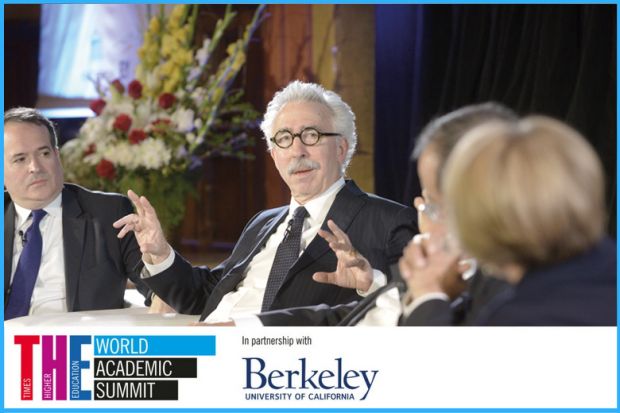Public universities must establish new sources of funding if they are to avoid having to choose between access and excellence, the chancellor of the University of California, Berkeley has claimed.
Nicholas Dirks said that many public institutions “feel they are faced with a dire existential choice of abandoning either their commitment to access or their commitment to excellence”.
“I believe we can avoid this existential choice. Instead it is vital for us to develop new funding mechanisms that will entail [our creating] innovative partnerships between public universities and the private sector,” he said.
Speaking to delegates at Times Higher Education’s World Academic Summit at the University of Melbourne on 1 October, Professor Dirks said he has been having conversations with a number of corporations to discuss new funding strategies. One partnership model the university is looking at is one in which a certain percentage of corporate earnings is reserved for the institution, “like a stock grant”.
“There are limits to what we’re going to get by returning to the argument that there should be public funding. There’s a real willingness from corporations to take on some kind of responsibility in this area,” he said.
He added that the definitions of public and private universities have changed following dramatic cuts in state funding; he said Berkeley receives only 13 per cent of its revenue from the state.
“What distinguishes today’s great public universities from the great private ones is neither the source of their funding nor their research missions. Today the great public universities in the US receive only a small fraction of their funding from the state,” he said.
“What truly and consistently distinguishes the great publics from the great privates has to do with the make-up of the student body and more specifically the commitment and ability of public universities to provide an excellent education to the broadest possible [section] of the public.”
He said this role of a public university has been put to the test in the US in recent years, as there has been no increase in the number of public universities, or in available spaces at existing institutions, commensurate with the growth of the population.
“As selection increases, so does exclusion,” he said.
Speaking after his speech, he said it was “comforting” talking to leaders of other public universities across the world who are struggling with the same issues, and cited the University of Cambridge in particular as an institution that has been an “inspiration”.
“I’ve been talking to the vice-chancellor of Cambridge, who is setting up a new campus just outside [the city] to house a growing number of postdoctoral scholars.
“It’s been useful for me to see how that great university has also been adapting for the future, not just staying within the cloisters of King’s and Trinity [colleges], but very much leading the way in terms of new areas of knowledge and entrepreneurship and innovation,” he said.
“There used to be an assumption in the US that public universities and entrepreneurship didn’t go together. If Cambridge can do that, that’s inspiration in a way for public universities in the US.”
后记
Print headline: Berkeley head: both access and excellence are possible




